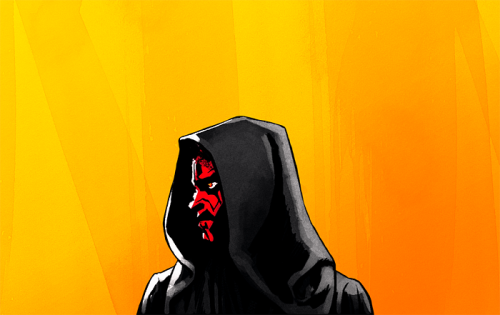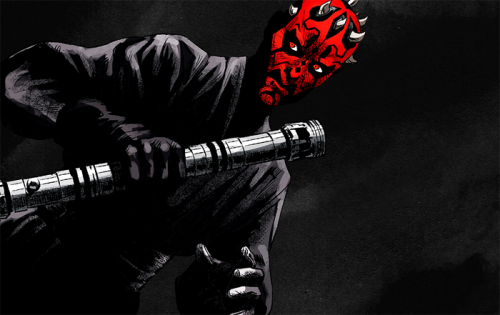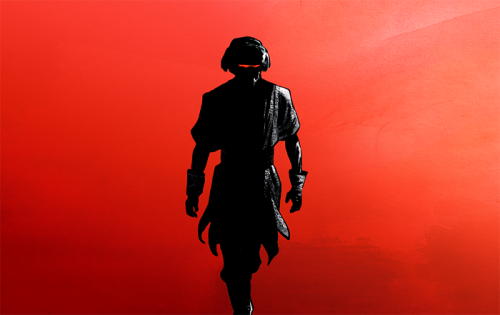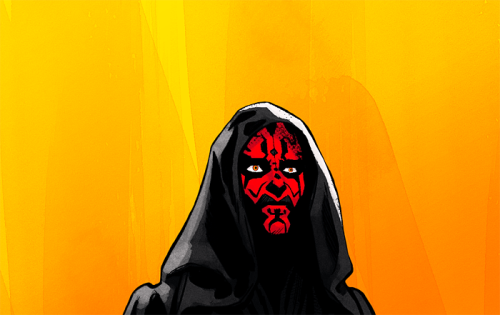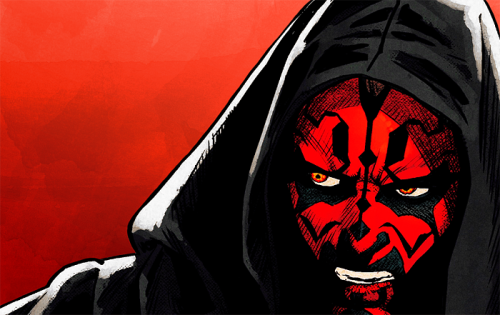The Clones Really Are A Fascinating Contrast To Stormtroopers. And I Don’t Mean Finn And The First
The clones really are a fascinating contrast to stormtroopers. And I don’t mean Finn and the First Order because they follow in the wake of The Clone Wars; I mean Imperial stormtroopers who dominated the Star Wars imagination first and the longest.
For decades, stormtroopers basically functioned like clones: they looked and sounded the same, even though we knew there were different people underneath the helmets they never took off; different faces, same personality.
Then actual clones basically inverted the model: genetically identical men used every opportunity to differentiate themselves, from their armor to their body modifications to their behavior; same face, different personalities.
The one place where the Venn diagram intersected was loyalty, but even then, they still inverted each other’s models. Clones designed to be unwaveringly loyal and obedient consistently questioned orders and their place in the galaxy. Meanwhile, stormtroopers from disparate planets and cultures unfailingly followed the orders of an impersonal Empire.
For all of Star Wars’s faults, for all the ways in which they dumb down or gloss over traditional scifi modes and themes, I can’t think of a more thorough exploration of cloning, the attendant questions of identity and free will, and the sociopolitical and metaphysical implications of a race of genetically identical men, of sameness in difference and difference in sameness, than the clone troopers.
More Posts from Solicherous and Others

Prequels speedrun


Anakin’s origin villain story
Taglist: @the-unkindled-queen (thank you for the idea lol) @deafmandalorian @aesnawan @intricatecakes @kiwi-the-first @obirain (if you want to get tagged, feel free to send me an ask!)
The reason The Lawless arc of The Clone Wars is so incredible is because narratively-speaking it forms a perfect self-contained tragedy no matter which character's perspective it's from:
For Satine, it's a political tragedy in the style of Richard II, focusing on a conflict between vying factions and the fall of a well-intentioned ruler, but also with echoes of Dido, Queen of Carthage in the sense that it's ultimately not the politics that screws her over as much as it is the doomed love story.
For Maul, it's a revenge tragedy like Hamlet, in which his desire for revenge on Obi-Wan ends up not only doing harm to innocents (like Satine) but also to himself and his own family (as with Savage's death).
For Obi-Wan, he's the object of the revenge tragedy while also being trapped in his own Orpheus-and-Eurydice "you can't save her no matter how hard you try" narrative.
For Bo-Katan, it's about how her pride and ambition prevents her from seeing right from wrong and from noticing the writing on the wall until it's too late to stop the events which have been set in motion and too late to save her sister. It's the idea of a royal house torn apart by betrayal, remorse, and the dashed hopes of reconciliation.
For Pre Vizsla, it's similar to Macbeth in that his desire for power and his designs on the throne end up being his downfall.
In these episodes, every character is the tragic hero of their own little disaster, and I think that is just so cool.
HOW IS FIVES NOT ON THE 20 YEARS OF LUCAS ANIMATION POSTER LIKE COME ON

he was the cool uncle

inspired by this post^
-
 arbitrarycategories liked this · 1 week ago
arbitrarycategories liked this · 1 week ago -
 whitetiger94ficthings reblogged this · 2 weeks ago
whitetiger94ficthings reblogged this · 2 weeks ago -
 solicherous reblogged this · 3 weeks ago
solicherous reblogged this · 3 weeks ago -
 solicherous liked this · 3 weeks ago
solicherous liked this · 3 weeks ago -
 cosmic-sen liked this · 3 weeks ago
cosmic-sen liked this · 3 weeks ago -
 supernova08 liked this · 1 month ago
supernova08 liked this · 1 month ago -
 random-writer-named-storm liked this · 1 month ago
random-writer-named-storm liked this · 1 month ago -
 bunnylove-4 liked this · 1 month ago
bunnylove-4 liked this · 1 month ago -
 booktiger13 liked this · 1 month ago
booktiger13 liked this · 1 month ago -
 pokipokipoki liked this · 1 month ago
pokipokipoki liked this · 1 month ago -
 enbyarsonbitch liked this · 2 months ago
enbyarsonbitch liked this · 2 months ago -
 irlsithspawn liked this · 2 months ago
irlsithspawn liked this · 2 months ago -
 knightoferebus-sw-dc liked this · 2 months ago
knightoferebus-sw-dc liked this · 2 months ago -
 noor-of-my-eye liked this · 2 months ago
noor-of-my-eye liked this · 2 months ago -
 archerygun liked this · 2 months ago
archerygun liked this · 2 months ago -
 readingwithfire liked this · 3 months ago
readingwithfire liked this · 3 months ago -
 deliciouslynervoustriumph-blog liked this · 3 months ago
deliciouslynervoustriumph-blog liked this · 3 months ago -
 shadownightstar reblogged this · 3 months ago
shadownightstar reblogged this · 3 months ago -
 artistofspirit liked this · 3 months ago
artistofspirit liked this · 3 months ago -
 forfeit-kneecaps liked this · 3 months ago
forfeit-kneecaps liked this · 3 months ago -
 tequilaingalaxy reblogged this · 3 months ago
tequilaingalaxy reblogged this · 3 months ago -
 zoyasmoony liked this · 3 months ago
zoyasmoony liked this · 3 months ago -
 shadownightstar reblogged this · 4 months ago
shadownightstar reblogged this · 4 months ago -
 haybellewrites liked this · 4 months ago
haybellewrites liked this · 4 months ago -
 whitetiger94ficthings reblogged this · 4 months ago
whitetiger94ficthings reblogged this · 4 months ago -
 supermetalfandomfreak liked this · 4 months ago
supermetalfandomfreak liked this · 4 months ago -
 insertaquestionmarkhere liked this · 4 months ago
insertaquestionmarkhere liked this · 4 months ago -
 lizziefox506 liked this · 5 months ago
lizziefox506 liked this · 5 months ago -
 confusionnation5 liked this · 5 months ago
confusionnation5 liked this · 5 months ago -
 z0mvi liked this · 5 months ago
z0mvi liked this · 5 months ago -
 venomousspiders liked this · 5 months ago
venomousspiders liked this · 5 months ago -
 hyperfixationjump liked this · 5 months ago
hyperfixationjump liked this · 5 months ago -
 crowleychild liked this · 5 months ago
crowleychild liked this · 5 months ago -
 gh0z1 liked this · 5 months ago
gh0z1 liked this · 5 months ago -
 soma-king liked this · 6 months ago
soma-king liked this · 6 months ago -
 moriiartist liked this · 6 months ago
moriiartist liked this · 6 months ago -
 oddball216 liked this · 6 months ago
oddball216 liked this · 6 months ago -
 sukurarose92 reblogged this · 6 months ago
sukurarose92 reblogged this · 6 months ago -
 kreativeangel0723 liked this · 6 months ago
kreativeangel0723 liked this · 6 months ago -
 melwhizk liked this · 6 months ago
melwhizk liked this · 6 months ago -
 archtech-fox liked this · 6 months ago
archtech-fox liked this · 6 months ago -
 sadcena liked this · 6 months ago
sadcena liked this · 6 months ago -
 another-plan-b liked this · 7 months ago
another-plan-b liked this · 7 months ago -
 noperopesaredope reblogged this · 7 months ago
noperopesaredope reblogged this · 7 months ago -
 noperopesaredope liked this · 7 months ago
noperopesaredope liked this · 7 months ago -
 neverrrrrrrmind reblogged this · 7 months ago
neverrrrrrrmind reblogged this · 7 months ago -
 neverrrrrrrmind liked this · 7 months ago
neverrrrrrrmind liked this · 7 months ago -
 kasscosplays liked this · 7 months ago
kasscosplays liked this · 7 months ago -
 pleasantgothbasketballthing liked this · 7 months ago
pleasantgothbasketballthing liked this · 7 months ago



